Deserters in Chechnya
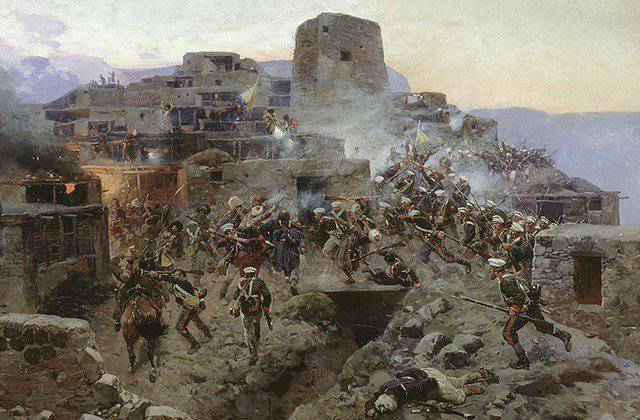
Russian defectors and deserters in the Caucasian War
For most of the XIX century, the Russian empire waged a protracted war with the tribes of the North Caucasus throughout the entire space of this rather big region - from the Caspian Sea to the Black Sea, from Circassia to Dagestan. But still little known is another side of this long conflict - the Cossacks and soldiers of the empire, who fled to the forests and mountains of the Caucasus to weapons in the hands of war against their fellow tribesmen. "Russian Planet" will tell about this side of the Caucasian War.
"The deserters delivered the first information to the mountaineers ..."
The war with the mountaineers broke out almost immediately, as soon as the royal administration at the beginning of the 19th century tried to establish control over their areas of residence in order to ensure a stable connection with the new provinces of Transcaucasia, which had just become part of the Empire. And almost immediately, Russian troops in the Caucasus were confronted with a massive desertion - in 1809 – 1810, recruits recently recruited from Muslims of the Volga region fled to the mountaineers.
The escape of the Kazan Tatars to the Chechens and Dagestanis was promoted not only by religious closeness, but also by obvious social discontent, which paradoxically connected the Caucasian war with the Napoleonic wars of Russia. The fact is that in the 1806 – 1807 years, after the defeat at Austerlitz, the government of Alexander I, expecting Napoleon's invasion of Russia, hastily gained throughout the country a huge “Zemskoy army”, almost 600-thousand-strong temporary militia. When, after the signing of the peace with Napoleon of Tilsit, the militia was dissolved, the tsarist government, contrary to previous promises, almost a third of the militia did not send home, but determined to be recruited.
The troops of the "Caucasian Line" were considered second-rate compared to the regiments that were to fight with the best armies of Europe. Therefore, not recruits from the Russian provinces were sent to the Caucasus, but former volunteers from “foreigners” - Volga Muslims. If the Slavic militia, who unexpectedly fell into the eternal "soldiery", organized a major riot in Kiev in 1807, then the Tatar militia sent as soldiers to the Caucasus responded with mass escapes to the mountaineers.
As a result, already in 1810, Major General Christopher Komneno (by the way, a descendant of the Byzantine imperial family Komnins), who was in charge of manning the troops, suggested not distributing Tatar recruits to the regiments stationed in the Caucasus. However, several decades later, already during the period of activity of Imam Shamil, the Russian military intelligence noted several Volga Tatars among his “murids”, several dozen former Kazan militiamen met in auls - living as free community members.
The Caucasian war and in subsequent years was considered "non-prestigious" compared to the external wars of the Empire. It is not by chance that the Caucasian shelves almost immediately became the place of reference for the guilty and unreliable. Representatives of yet another disloyal empire of the national minority, the Poles, were among the first “military exiles” in the Caucasus. Dry military statistics show: from 11 400 natives of the former Rzecz Pospolita, who fought in Napoleon’s army and were prisoners of war in May 1814, 8900 joined the Russian army in the North Caucasus and Transcaucasia. The second mass wave of Polish penal officers - 9100 soldiers and officers from the former army of the Polish Kingdom - hit the Caucasus in 1832 – 1834, after the defeat of the first anti-Russian uprising in Poland.
In 1840, the French consul in Tiflis reported to Paris that the Poles make up one fifth of the Russian troops in the Caucasus. It is not surprising that such a number of fines and disloyal soldiers gave rise to the massive desertion of the Poles to the mountaineers.
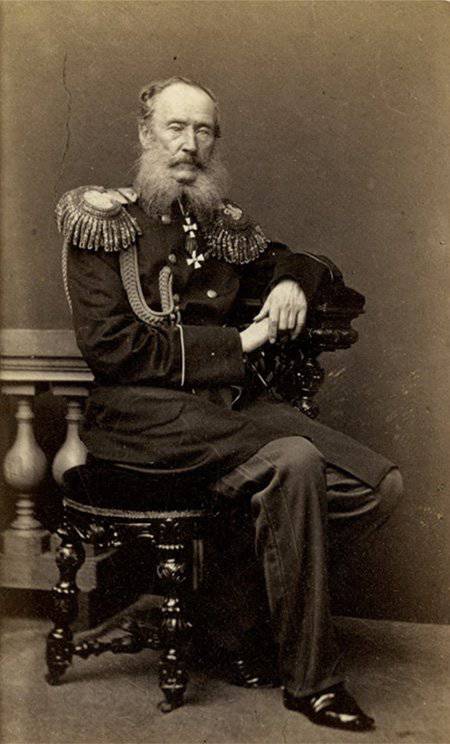
In the same 1840, General Pavel Grabbe (a talented military intelligence officer in the era of the war with Napoleon and a member of one of the secret societies of the Decembrists) reported to the Minister of War Alexander Chernyshev (by the way, another military intelligence leader in 1812) about the activities of Polish defector: “ According to the spies, these deserters delivered the first information about the plight of Fort Lazarev to the mountaineers and gave the first thought of attacking it, accepting the execution of this enterprise. They invented a new kind of weapon - a long pole, to one end of which a scythe is attached to prick and chop, and to the other hooks to climb on the fortress walls. Now, this weapon is in the highlanders in a significant amount. They shoot the attacked places, give the necessary advice for organizing gatherings, and during the assault they always go to the head of the column. Between them, the non-commissioned officer of one of the Black Sea Line Battalions, who served as captain of artillery in the Polish army during the 1831 insurrection of the year, is particularly distinguished by its enterprise.
The “new kind of weapon”, about which General Grabbe speaks, is in fact the traditional weapon of Polish insurgents - with braids converted into spikes, Polish “kosyneri” fought with Russian troops during the Kosciusko uprising at the end of the 18th century, and then during the rebellion 1830 – 1831's. Once in the Caucasus, Polish deserters taught the Highlanders to use their traditional weapons.
Mentioned by General Grabbe, "a non-commissioned officer of one of the Black Sea Line Battalions, who served as captain of artillery in the Polish army during the 1831 insurrection of the year," this is apparently someone from Baranowski who commanded a detachment of the Circassians. However, when Baranovsky tried to leave for Turkey to return from there, the Circassians surrendered him to the Russian authorities.
"Leave Muscovites"
It was the social backwardness of the North Caucasian peoples, who retained tribal relations and traditional slavery, was the main obstacle for the mass desertion of soldiers from the Caucasian regiments. Only those deserters who managed to intermarry and fit into the highlanders' tribal families could count on their attitude as their own. Others still remained, albeit useful, but strangers, and often were simply a convenient commodity for exchange and sale. This was especially true of the most numerous Circassian tribes in the North Caucasus, which largely retained paganism.
If in the east of the Caucasus, in Chechnya and Dagestan, deserters who converted to Islam often became almost their own, then the situation with the Circassian pagans was quite different. For example, in 1815, the Russian military authorities concluded a very colorful contract with one of the Circassian princes, well reflecting the mores then prevailing in that region. The Russians returned eleven runaway slaves to the head of the Circassian tribe and officially forgave him for the murder of three Russian soldiers. Instead, the mountaineers issued three deserters, their guns and ammunition, vowing from their sacred trees the supreme god Thashho, henceforth, not to make raids and give out defectors.
In 1837, British scout Longworth reported to London that the Circassian tribes had several hundred Polish slaves from deserters. The Englishman reported that the Circassians sold the Poles to Turkey and even brought the average price - 4 livre per head (about 25 silver rubles, three to four times cheaper than the average price of Russian serf of those years).
It is noteworthy that the tsarist government had a completely official price list for the redemption of prisoners in the Caucasus — for example, in 1841, a soldier or an ordinary Cossack "cost" 10 rubles in silver. Naturally, it was more profitable to sell the captured Turkish merchants. Moreover, the Russian command was not always in possession of full-fledged silver, trying to pay for the captured paper banknotes and even incomprehensible to the mountaineers.
At the other end of the Caucasus, in Chechnya and Dagestan, the imams Gazi-Muhammad and Shamil, with varying success, tried to create a single Islamic state instead of scattered tribes and put up a more organized resistance to Russia. Therefore, here the highlanders, led by Islamic “Murids”, viewed deserters not as a free commodity for exchange and sale, but as a useful resource for resistance. After all, even Imam Ghazi-Muhammad (Kazi-Magomet in the Russian pronunciation of those years), who was the first in the Caucasus to declare “ghazavat” (holy war) of Russia, only one grandfather was a famous Islamic scholar - “alim”. The origin of the second grandfather was quite different - as the rumors among the mountaineers recorded by the Decembrist Bestuzhev-Marlinsky who were exiled to the Caucasus as ordinary soldiers, this ancestor of the first imam of Chechnya and Dagestan was just a Russian deserter who had fled from the imperial army during one of the XVIII Caucasian campaigns of the XVIII century.
Trying to organize regular resistance to the Russian Empire, supporters of the “Gazavat” rather well distinguished the national composition of the opposing troops and knew about the anti-Russian uprising in Poland. Therefore, as witnesses testify, in 30-s of the XIX century, Russian soldiers, surrendering to the "highlanders-murids" to stay alive, often shouted: "Pole!" Pole!"
Contemporaries mention how in the headquarters of Imam Shamil in the village of Vedeno, Alexander Rulesky, an officer of the Russian army of Polish origin, who had gone over to the highlanders, was greeted with gunfire and several guns at the village of Vedeno. An ambitious Pole took the name Iskanderberk, promised Shamil to arrange silver mines in the mountains and improve its fortifications. However, soon the defector had contention with the imam’s confidants; he tried to escape from the highlanders, was captured by Russian soldiers and sentenced for desertion to be shot.
In the 1847 year, when Russian troops stormed the aul Salty in Dagestan, from the besieged several nights someone's voice shouted in Polish, calling on soldiers and officers of Polish origin to "leave the Muscovites."
"Splashing it wetly - you will not enter!"
But most of the deserters of the Caucasus were not “foreigners” and “non-believers”, like Muslims Tatars or Catholic Poles, but completely Orthodox Russian people.
A participant in the Caucasian War, Lieutenant General Vasily Potto (from Russian Germans) described one very colorful episode that occurred in August 1824 of the year during the campaign of the Russian detachment against the Kabardians across the Urup River: “A fugitive Russian soldier was noticed during a skirmish among the Circassians. His right hand was torn off to the elbow, but he was promptly controlled by his left and with the help of podsochek he shot with remarkable accuracy. Charging a rifle, he coolly and as if teasing the soldiers, sang a Russian song: “They have fallen in love, good fellows have broken off.” Exactly enchanted, he stood on a high cliff, showered with bullets, and only when some of them were already lying very close, he shouted loudly: “You splash liquid - you will not hit!” And, falling to the podsokam, sent shot after shot. The deserter is very angry soldiers ... "
In two days of fighting, the Russians defeated the Kabardians, took many prisoners, but could not find the armless deserter-sniper, none of the Circassians gave him away.
Desertion and the transfer to the side of the enemy have always been considered the most serious military crime. The “Military Criminal Regulations” of the Russian empire 1839 of the year provided for the punishment of a part in the form of 500 – 1500 strikes of rods or gauntlets. For the second escape, a deserter was entitled to three thousand blows, which de facto meant a painful death penalty. In wartime, the transition or attempted transition was punishable by execution, in special cases at the discretion of the court - by hanging.
However, all the long years of the Caucasian war, desertion did not stop. As mentioned above, the regiments of the "Caucasian Line" were formed on the residual principle by second-rate, disloyal, or punished soldiers and officers. Some forts of the Black Sea coastline, according to contemporaries, essentially "turned into a jail fined."
According to official reports of the Tenginsky Infantry Regiment that fought in the Circassian regions, in 1837 more than half of its soldiers were considered “unreliable”. It was in this regiment that Lieutenant Mikhail Lermontov served, sent for a duel from the St. Petersburg Guard to the Caucasus. Among his colleagues in the Tenginsky regiment was, for example, the Polish prince Roman Sangushko, demoted from the horse guards for participating in the rebellion, a descendant of the monarchs of the Grand Duchy of Lithuania, served in the Tengin regiment as a private. Kombat penalty Lermontov was Konstantin Danzas, lyceum friend and Pushkin's second in the last duel of the poet. In fact, for this duel, Colonel Danzas was sent from St. Petersburg with a decrease in rank to the Caucasus.
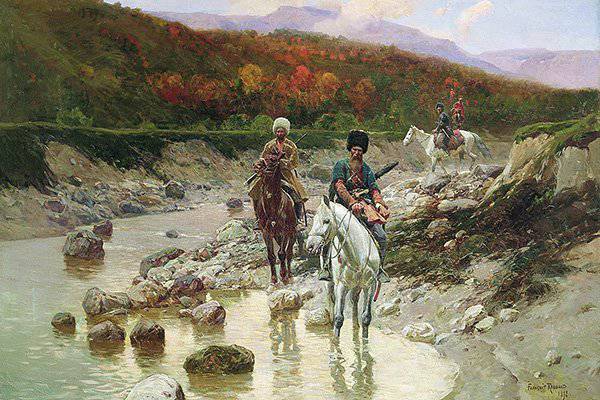
The Tengin regiment then fought with the Circassians in the area of the modern city of Sochi - at that time this resort was one of the most disastrous places of the Russian Empire, with deadly malaria and no less deadly Aboriginal people. Next to the poet Lermontov and the Lyceum student Danzas, a former serf from the Kiev governorate, an ordinary soldier, Arkhip Osipov, fought at the beginning of his service for being deserted and driven out "through the ranks" with a thousand gauntlets. 22 March 1840, the former deserter Arkhip Osipov, sacrificing his life, blew up the powder warehouse in the fortification of Mikhailovskoye captured by the Circassians - now it is the village of Arkhipo-Osipovka named after the heroic deserter in the territory of the resort Gelendzhik.
By the way, both of the “noble” brother soldiers of Arkhip Osipov - Lermontov and Sangushko - also fought bravely, being in the “team of hunters”, speaking in a modern way, in special forces. However, not all “penalty box”, especially those of non-noble origin, sought to remain loyal to the distant Tsar in St. Petersburg.
The abundance of "second-rate" and "fined" in the Caucasian regiments automatically increased the percentage of potential deserters and defectors. In the same Tenga regiment in 1844, two soldiers were detained, trying to escape to the mountaineers with a pood of gunpowder for a thousand cartridges. The investigation even revealed the existence of a solid dachshund, according to which gunpowder and ammunition from the regiment’s warehouses were sold to the mountaineers — a silver ruble for 60 cartridges. So heroism and desertion in the conditions of the Caucasian war coexisted in the same barracks.
"Privatization of war"
In addition to internal factors, the very nature of the perennial war in the Caucasus contributed to the escape of the highlanders. In fact, it was not a war in the usual sense, but a specific life in the context of incessant partisan "guerrilla", where military operations on both sides often differed little from predatory raids.
“Caucasian war is not an ordinary war; The Caucasian army is not an army making a campaign. Rather, it is a warlike people, created by Russia and opposed to the belligerent peoples of the Caucasus to protect Russia ..., ”wrote Prince Xyatopolk-Mirsky, adjutant to the Commander-in-Chief of a separate Caucasian corps, in 1855.
A curious fact - a significant part of the regiments who fought in the XIX century in the Caucasus, have been in this region since the days of Peter the Great's campaign in Persia at the beginning of the XVIII century. The soldiers of the regiments who fought with the mountaineers were accustomed to being aware of themselves, in fact, as a separate tribe, calling themselves "Caucasians", and the units that had recently come from the central provinces called with a certain shade neglect "Russian".
Officers noted rivalry and even enmity of the "Caucasian" and "Russian" parts. It got to the point that the “Caucasians” did not consider it obligatory to render support “Russian” when they fell into a difficult situation in battles with the mountaineers. At the same time, parts of “Caucasians” maintained close relations among themselves, calling such colleagues in the Caucasian manner “Kunaks” - the proceeds of “Kunaks” in battle were considered holy.
Almost all of their lives, Russian troops who had fought in the Caucasus were strikingly different from the regular army of the Russian Empire in form, weaponry, life and tactics. The specificity of the Caucasian War rejected the resigned formal discipline - an independent, initiative warrior rather survived on this war. There was its own slang, different from all-army jargon: here there was a Turkic "barant" (hijacking someone else's cattle), and a Turkish "yasyr" (prisoner), and a purely Russian "raising aulchik" (pillaging the mountain village).
Often, the Caucasian regiments conducted their own farming — with individual regiments, battalions and companies there existed their own “artel” flocks of sheep and horses, “artel” grain fields, and so on. With such an economy and on such a war, the soldier spent his whole life - and this even more turned the Caucasian regiments into original tribes.
The nephew of the powerful gendarme chief Konstantin Benkendorf commanded a battalion in 1845, participating in several expeditions against the Chechens and Circassians. In his memoirs, he described a very colorful and illustrative scene that occurred at the market in the fortress of Grozny (now the city of Grozny). There, the soldiers of the Absheron regiment had a fight with the Chechens, not finding out the price of the sheep. The ranks of the Kura regiment that came to the scuffle rushed to the aid not of the soldiers, but of the highlanders, explaining their behavior in the following way: “How can we not defend the Chechens ?! They are our brothers, so 20 has been fighting for years! ”In this case,“ we are with them ”was twofold - the soldiers fought against these Chechens, then they fought with other mountain tribes.
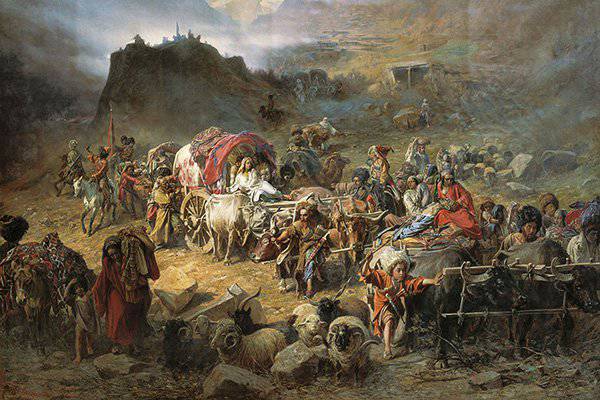
Over the decades of service, the soldiers of the Caucasian regiments adopted both the lifestyle and the psychology of their enemy. Moreover, in the course of the half-century Caucasian War, the enemy repeatedly became an ally and vice versa - the tribes and clans of the highlanders, permanently at enmity with each other, easily entered into alliances and truces with the Russian command and just as easily broke them. The concept of "peaceful" and "non-peaceful" mountaineer was very relative, switching over to the side of the enemy was not a betrayal of the clan and most were not psychologically condemned. The tribal morality lived in a different dimension than state abstractions of the oath and of the statute.
Russian soldiers, in fact, illiterate peasants who, in their youth, had fallen from deaf villages in the Caucasus into conditions of uninterrupted and incomprehensible semi-peaceful semi-military existence, over the years of service, they easily adopted this psychology of their highlander neighbors. And the escape from the barracks to the neighboring mountain village, in fact, the same village, was psychologically very different from going to the side of an alien regular army. Therefore, the Caucasian wars in percentage terms gave far more defectors than the brutal war with Napoleon.
Even the 19th century military historians noticed, not without surprise, that the soldiers of the Caucasian regiments, in fact, copied the "tribal" relations of the highlanders - while remaining loyal to the clan or tribe, the highlanders easily fought against their neighbors from related tribes. Similarly, Russian soldiers who fled to the mountains usually refused to fight against "their" regiment, but without embarrassment fired at soldiers of foreign units.
This whole complex psychological complex, which during the years of conflict transformed soldiers from regular army officials into members of a kind of separate tribe, was described by war historians as “privatization of war”. The war became not the fulfillment of abstract duty and bureaucratic orders, but personal life and way of life. And in the specific conditions of the Caucasian “guerrilla”, such a life often led a person to the enemy's house - especially since they not only fought with this enemy, but also lived side by side for decades. The deserter "only" changed his Caucasian regimental "tribe" for a tribe of highlanders.
“Shamil gives freedom to deserters ...”
For half a century of the Caucasian War, Imam Shamil was the only leader of the highlanders who, not without success, tried to create a regular army to confront Russia. Unlike ordinary tribal leaders, he was a political leader with a universal Islamic ideology - a supporter was determined not by blood-kinship, but by ideological and political choice, shaped in the spirit of that place and time by the adoption of Sufi Islam - “muridism”.
That is why Shamil led a deliberate policy to attract and use deserters. In 1840, he wrote to his governors, “Naibs”: “It is known that those who fled to us from the Russians are loyal to us and trustworthy ... Turning to the faithful, they are cleared. Give them everything you need for life and a normal existence. ” The Imam ordered each defector to be brought to him, personally interrogating and determining their further fate. He left artillerymen, blacksmiths and specialists of other rare professions in the mountains with him.
All rights of a full-fledged member of the community were received by those defectors who converted to Islam and married local women. Shamil even personally performed the ceremony of marrying several new deserters and mountain women from the defeated villages. The headquarters captain Runovsky, who had fought a lot in the Caucasus and personally knew Shamil, recalled how many of the local women left their parents' homes to marry the Russians, since the latter treated women much better than the highlanders.
The new policy of Shamil with respect to deserters is very concerned about the Russian command. In January 1842, the head of the left flank of the Caucasian line, Lieutenant-General Olszewski wrote to the authorities: “It is known that our military deserters were still considered Chechens to be yasyrs and forced to perform the most difficult jobs ... Today, Shamil changed this folk custom and decided to give freedom to all military deserters. He had already assembled up to 80 people of fugitives, of whom some, if they were from strong people, bought and chose the rest. Shamil kept the guards with them from these people, gave them weapons and took them land in Dargo for settlement ... The ill-treatment of the Chechens with our military deserters kept many unreliable soldiers and especially Poles from escaping, but if they now know that Shamil gives freedom to deserters, then I fear that the shoots will increase. I remember that in the expedition beyond the Kuban in 1834, there were extremely many Poles who ran, but the shoots diminished when the Poles learned that the Shapsugs were treating them badly and exhausting them with hard work ... "
Interestingly, General Miltiy Olszewski himself was a Pole from Grodno, and he addressed his report on Chechens, Poles and Russians to the Ostsee German, General Grabbe. The Romanov Empire was multinational and supranational — the Russians, Germans, Georgians, Poles, Kuban Cossacks, most of whom came from Ukraine, and other nations of the Empire conquered the Caucasus.
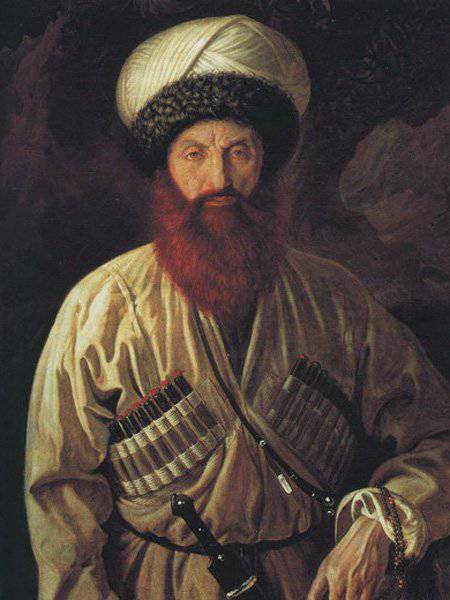
The fears of the Pole-General of the faithful Russian monarchy were not in vain. At the peak of success, the army of Shamil numbered several dozen guns. And according to eyewitnesses, the artillery attendants were mostly deserters from the Russian army. Near the village of Vedeno, an entire village of deserters formed, commanded by two fugitive officers. Their main occupation was the repair of artillery guns and attempts to organize the production of gunpowder.
In the 1847 year, as the memoirs of the Russian officers tell, there was a tragicomic case - a lieutenant of artillery fled to Shamil, a big fan of drinking. In the state of binge drinking, he missed stocks of gunpowder in the arsenal entrusted to him, fell into an alcoholic psychosis, was afraid that he would be accused of selling gunpowder to the enemy, and ran to the mountaineers. However, the subsequent revision did not reveal any shortage of gunpowder - the drunk lieutenant was mistaken.
Also, a small settlement of deserters existed near the residence of Shamil near the aul Dargo. Here the main occupation of the defectors was the protection of the imam. Shamil had to spend most of his forces on attempts to subjugate the Dagestan feudal lords and fragmented mountain tribes, who were not eager to enter his theocratic "state". Therefore, the Russian deserters who were not covered by the tribal relations were a more reliable support of the Imam's power than the highlanders associated with the authority of the clans and elders. Several “Murids” of deserters were part of the Imam’s personal guards.
The Islamic leader even allowed deserters who lived in the Dargin settlement to smoke and drink alcohol, provided that they would not do this in public. According to Russian intelligence, the Russian deserters who lived in Dargo "every two or three days came to the exercises under the command of a certain soldier Idris-Andrei."
From the deserters was formed and the military band of the army of Shamil, who performed Russian sound signals and military marches. One of the officers who participated in 1845 during the campaign of Count Vorontsov to the aul of Dargo recalled: “One day the imam brought his soldiers with a drum and trumpets to play, which they played and had fun with. "The Agenda" and "Dawn", punched by our runaway drummers and hornmen, was very decent. "
“They will not want to remain in poverty among the Gentiles ...”
At the peak of the number of Russian deserters in the "state" of Shamil, there were up to four hundred. We repeat - we are talking about defector and prisoners who agreed to fight on the side of the enemy. Those who were captured in battle and did not cooperate with the highlanders remained in the position of slaves and living goods for ransom and exchange.
Naturally, the defectors tried to tie the blood. When Shamil in the spring of 1845 ordered the shooting of prisoners by officers and soldiers at Dargo 37 with a canister, Russian deserters stood by the guns.
The Russian command also tried to influence deserters with carrots and sticks. The Caucasian governor, Count Vorontsov, in 1845 year, during the march on the residence of Shamil, issued a special proclamation, in which he promised complete forgiveness to those deserters who voluntarily return to the ranks: “By the highest Sovereign Emperor, all Russian soldiers fleeing from different regiments and teams to the mountains, that those of them who voluntarily come from the races, forgive all the merciful and will continue to do so without any punishment or any penalty for service ... The Commander-in-Chief hopes that the escaped soldiers will hasten ospolzovatsya monarch's forgiveness and mercy and will not want to stay longer in poverty among the Gentiles. "
It is curious that similar proclamations calling for soldiers were distributed by the Highlanders. In 1843, the Cossack centurion Atarschikov (by the way, a relative of the first Russian commandant of Armavir), who had become Islam, became Hadzheret Muhammad, who fled to the former colleagues appealed to the lower ranks to call the lower ranks to flee to the mountains, because he “became at the Abadzekhs, first-class wisdom ”(by a nobleman). The quick captain also promised help if the deserter wishes to go to Turkey or wherever he wants. The military authorities, concerned about the mood of the soldiers, prescribed strictly to ensure that "such letters did not have any publicity between the lower ranks."
Several Russian deserters particularly distinguished themselves in the army of Shamil, along with the "murids" from the mountain peoples. So the ensign of the Tiflis Chasseur Regiment of Zaletov and the soldiers Beglov helped the Chechens to take up the fortifications of Tsatanih, Akhalchi and Gotsatl.
In the autumn of 1850, the dragoons of the Nizhny Novgorod Rodimtsev regiment ran to Shamil. Having converted to Islam, he settled in the village of Dylym, married a Goryanka woman and was awarded a silver order for his participation in the battles in Shamil's personal guard. The Imam, creating his state according to the Russian example, established several orders and medals - these were polygonal silver stars with the image of a crescent and inscriptions from the Koran, worn on the leather patch at the left shoulder.
The same orders, but five years earlier, Terek Cossacks Zot Cherin and Filat Aleshechkin who defected to the Chechens were awarded; less than with the Russian army.
Shamilev's "order bearer" Zot Cherin in April 1845 of the year was captured by his own Cossacks, and he was completely in the spirit of stories Taras Bulba - leaving the chase after the next Chechen raid on Cossack villages, Cherin lost his dagger and was captured by the Cossacks while he was searching for loss. It is curious that a fugitive Pole soldier participated in this raid along with Chechens and Cossacks-deserters. By the verdict of the military court, Zot Cherin was publicly executed in the village of Chervlennaya in the presence of representatives of the Grebensky regiment of the Tersk Cossack Army, which the deserter belonged to before his escape. In the same year, Filat Aleshechkin was also shot - despite the conversion to Islam, the runaway Cossack occasionally visited the village for home-made wine - “dumb”, until he was caught by a Cossack guard.
It is noteworthy that all contemporaries and eyewitnesses noted a rather conditional conversion of Russian deserters to Islam. As one of the Cossacks wrote: “Renouncing the faith of their fathers, the fugitives obviously looked at it as a practical necessity, moreover, of a completely temporary nature.” In 1856, Russian intelligence agents reported on a gathering of Russian deserters in Chechnya, in the territory of the current Gudermes district: “Many soldiers, Don and Line Cossacks, up to a hundred people, converged on Easter in the village of Nurka, where they drank vodka and brago and had conversations .. . "
"Daring conclusions at the expense of the government ..."
In addition to the violent heads who fled to the Chechens for a free, predatory life, another type of people went to the mountains, away from power, who were fanatically religious schismatics. For several years on the territory of the Islamic "state" of Shamil even existed a whole schismatic monastery.
It was founded by 30-year-old Terek Cossack Starover Timofey Yankhotov, who in November 1849 fled to the mountains with several Cossacks. Yanhotov was literate, well-versed in Old Believer theology and, like many tertians, knew Chechen well.
Shamil clearly intended to use the schismatics in the fight against the tsarist government, he personally met with Yankhotov and gave him permission to create a Christian hermitage in the highland Chechnya, near the village of Ratli. As one of the inhabitants of the monastery later told military investigators: "They began to pray in the silence and silence of the mountain desert, far from the people and the kingdom of Antichrist, calculating the time of his coming."
Gradually, separate Cossacks and Cossacks ran to the skete, sometimes whole families, especially those who were committed to the old faith, ran. The fugitives survived by producing wooden tubs and barrels, which the Chechens willingly exchanged for corn bread. Through the Chechen Kunaks, the schismatics sent news to the Cossack villages that the “kingdom of the Antichrist was close,” and other “bold conclusions about the government,” calling for the Old Believers to come to themselves.
In two years, an entire settlement of several dozen families was formed. It is noteworthy that the leaders of the Old Believers who fled to Chechnya were at enmity with the “suburb” of army deserters near the aul Dargo. However, part of the dissenters could not withstand asceticism, eternal fasting and prayers, and fled to the settlement of deserters, where there was a completely free life with music and vodka.
In the summer of 1852, Yanhotov, in agreement with Shamil, went to the Terek to bring new schismatics to the mountains. However, in his native village he was detained on the denunciation of his own wife, who did not share her husband’s schismatic fanaticism. A military court sentenced Yankhotov for desertion to be shot. But Baron Rosen (German), commander of the Cossack regiment of Yankhotov, and General Prince Eristov (Georgian) decided in such a delicate matter to replace the public execution of religious authority by thousands of gauntlets and “prisoner companies for all time”.
In the summer of 1853, Shamil, without waiting for the mass transition of the Old Believers to his side, heeded the numerous requests of the Islamic clergy and ordered the Christian hermitage to be liquidated. The schismatics were offered to move to the suburb of deserters, convert to Islam and serve in the army of the Imam. Those who refused - a few dozen people - the Highlanders killed.
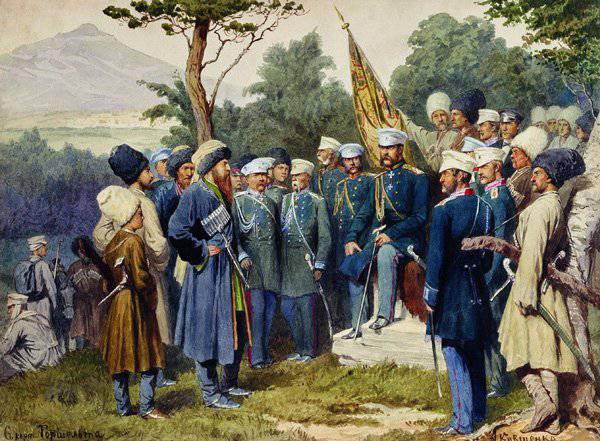
The fate of most deserters ended up tragically. Unlike the same mountaineers, whom Russian soldiers and officers perceived as a worthy opponent, the deserters could not count on leniency. With the captive deserters and deserters, the soldiers usually dealt themselves, not waiting for the military tribunals.
When in August 1859 of the year in the besieged aul of Gunib, Imam Shamil gave his final battle, there were about thirty Russian defectors among the defenders of the last fortress of the imamat, who served four guns and fought for their leader until the end. Shamil with his family surrendered and was transferred with honor to St. Petersburg. Of the deserters, only one Russian artilleryman was captured alive, who inflicted heavy casualties on the fire from his gun. The enraged soldiers beat him with butts and threw them into the fire.
Already after the end of the Caucasian War, at the end of the 19th century, local historians of local lore recorded a song of Russian deserters with the Grebensky Cossacks:
Dashing orphan
Thought to run into the mountains.
There will soon be the demise
And what more to wait for?
Only now just get through
Through the Terek and forests
I swear by Allah
And look at the heavens,
I will receive their faith in the Prophet
I will learn their dogmas
And then by the will of rock
Steal from them start.
Information